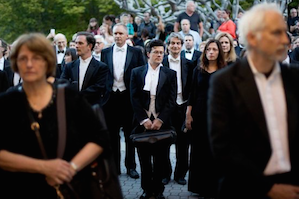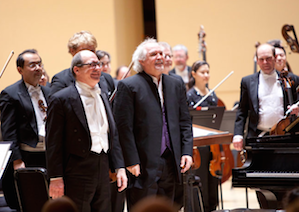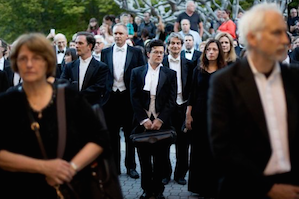
Photo by David Goldman
On Monday, in the fourth week of a devastating lockout by the Atlanta Symphony, the organization's CEO and embodiment of "tough management" approach to difficult negotiations, resigned. That, in combination with a so-far misreported, but still possible mediation, provides a glimmer of hope that some of the season may yet be saved.
I have nothing to add to Lisa Hirsch's report:
Stanley Romanstein — excuse me, Dr. Stanley Romanstein, Ph.D. — has resigned as CEO of the Atlantic Symphony. The ASO's statement says this:“I believe that my continued leadership of the ASO would be an impediment to our reaching a new labor agreement with the ASO’s musicians.”
You bet, Stan. Er, Dr. Romanstein. It's likely a good thing that you are departing within weeks of the stupid and damaging lockout you instituted, rather than the nearly two years it took for Michael Henson to leave the Minnesota Symphony.
P.S. Every press mention of him that I have seen calls him Dr. Romanstein and often includes the letters after his name. I checked, and he really does have a doctorate, in musicology, which doesn't exactly qualify a person to take a position running the business side of a major symphony orchestra [Columnist's note: Or pretend to be a physician — which, at least to me, is what "Dr." means.]

Photo by Jeff Roffman
Comment from the Atlanta Arts and Culture Blog:
The lockout is the second in two years of ASO musicians, and much of their frustration during tense collective bargaining agreement negotiations in 2012 and now has been aimed at Romanstein.Following Romanstein’s surprise resignation, the executive committee of the ASO board appointed Terry Neal, a retired Coca-Cola Company executive and current ASO Board member, to serve as ASO president on an interim basis.
Seeking a sustainable operating model for an organization that has ended 12 consecutive years with a deficit, Romanstein was pushing a proposal in which management would control the number of musicians (or, to employ the industry phrase, “the complement”) going forward.
In the 2012 lockout, the ranks of full-time ASO musicians were trimmed from 95 to 88, with the musicians also grudgingly agreeing to an average pay cut of 14 percent. Leaders of the Atlanta Symphony Orchestra Players’ Association charged that Romanstein broke promise to them then to not seek additional concessions this time and were not willing to trust him with ultimate power over how open musician positions would be filled.
Also on Monday, one of the world's top arts management experts, former Royal Opera House, John F. Kennedy Center, American Ballet Theatre, etc. "turnaround king" Michael Kaiser, called ASO management demands "shocking" in The Huffington Post:
It is shocking because one must expect that after locking out its musicians, the management of the Orchestra (and its parent, the Woodruff Arts Center) had some idea of the size cut that would be required to balance the budget.Why would one lock out artists and then settle on a contract that would not stabilize the institution for even two years? Was there so much pressure to settle the lockout and open the season on time that an agreement was reached that solved only a piece of the problem?

